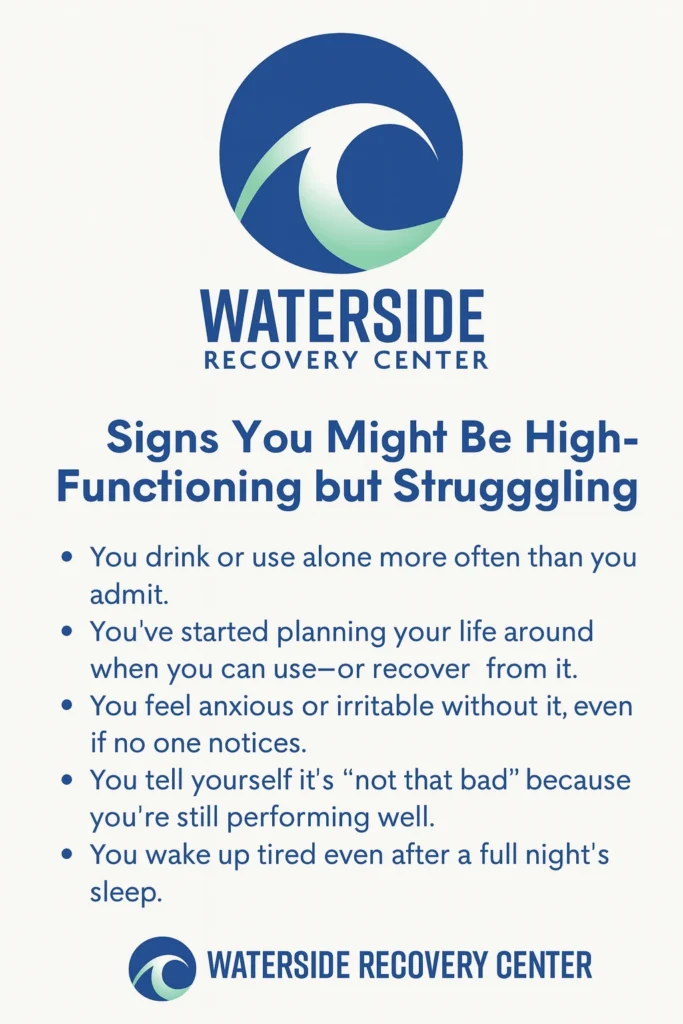It wasn’t a dramatic collapse.
No overdose. No intervention. No public spectacle.
It was a toothbrush.
A regular Tuesday morning, the kind where the kids were still asleep and the house was quiet. My client stood in the mirror brushing their teeth—and couldn’t remember falling asleep the night before. Not the last drink. Not crawling into bed. Not even setting the alarm.
That was the moment they finally said it.
“I need help.”
High-Functioning Doesn’t Mean Healthy
We tend to associate addiction with chaos. Missed work. Lost custody. Public unraveling. But some of the people I treat are still showing up on time, still earning praise at work, still hosting family dinners.
They’re also drinking until 2 a.m.
White-knuckling through anxiety.
Wondering if anyone notices their hands shaking.
Being high-functioning means they’ve learned to perform wellness. But it doesn’t mean they’re well.
They often don’t ask for help because they’re terrified of what help might cost—status, identity, control. But eventually, the cost of keeping it hidden becomes higher than the cost of telling the truth.
The Quiet Cracks That Lead to Collapse
With high-functioning clients, the red flags don’t always wave loudly. They flicker—subtle, deniable, easy to rationalize.
My client said it best:
“I used to be able to stop. Then I needed a reason to stop. Then I stopped looking for one.”
Here’s what those cracks look like:
- Hiding bottles in places they forget about later.
- Pouring a drink before the sun sets, then justifying it as “a long day.”
- Waking up already anxious about when they can drink again.
- Losing chunks of time—and covering it up with productivity.
It’s a house built on sand. It looks fine until the weight of one small thing sinks the whole floor.
Why an Outpatient Program Made Sense
When my client finally reached out, they weren’t looking for punishment. They weren’t ready to walk away from their life. They were looking for a way through.
That’s where our Outpatient Program in Plymouth County, MA came in.
Outpatient treatment offers structure without full disruption. Clients can maintain work schedules, family roles, and daily routines—while receiving real support and accountability.
It’s not a watered-down version of care. It’s a different shape of care—designed for those whose lives are still functioning, but whose mental and emotional states are wearing thin.
At Waterside Recovery, outpatient clients receive:
- Individual and group therapy
- Relapse prevention support
- Psychiatric care, if needed
- Flexible scheduling to meet life’s demands
For my client, this meant they didn’t have to choose between recovery and responsibility. They could finally do both.
Signs You Might Be High-Functioning but Struggling
You might be high-functioning—but that doesn’t mean you’re okay. If any of these sound familiar, it might be time to reach out:
- You drink or use alone more often than you admit.
- You’ve started planning your life around when you can use—or recover from it.
- You feel anxious or irritable without it, even if no one notices.
- You tell yourself it’s “not that bad” because you’re still performing well.
- You wake up tired even after a full night’s sleep.
If your private reality doesn’t match the face you show the world, that’s not hypocrisy—it’s suffering.
You don’t have to keep living that way.

Naming the Need Is the Turning Point
Here’s the truth I see every day as a clinician:
The people who make the most progress aren’t the ones who hit the hardest bottom. They’re the ones who get honest before the crash.
My client’s bottom wasn’t a court date or a hospital bed. It was a moment of lucidity in front of the mirror. A realization that this—this level of numbness, forgetfulness, emotional erosion—wasn’t sustainable.
That’s enough. That’s always been enough.
What Happens When You Finally Say, “I Need Help”
In the first week of our outpatient program, my client said something I’ll never forget:
“I feel like I’ve been holding my breath for five years. I can finally exhale.”
That’s what good treatment does. It doesn’t shame you. It lets you breathe again.
In our Outpatient Program, clients learn how to:
- Untangle stress from substance use
- Identify emotional triggers and coping skills
- Build a version of life they don’t want to numb out of
It’s not about being perfect. It’s about being present.
If You’re Waiting for Rock Bottom—Stop
Rock bottom is a myth for a lot of high-functioning people. You don’t need to lose everything to get help. You just need to admit you don’t want to keep living like this.
Whether you’re in Plymouth County or looking for an Outpatient Program in Bristol County, MA, know this:
Your exhaustion is valid.
Your fear is valid.
And your healing can start before everything breaks.
FAQ: Outpatient Program at Waterside Recovery
What is an outpatient program?
An outpatient program is a structured form of treatment for substance use or mental health challenges. It allows individuals to receive therapy, support, and education while continuing to live at home and maintain daily responsibilities.
How do I know if outpatient care is enough?
If you’re functioning day-to-day but privately struggling, outpatient care can be a powerful first step. It’s designed for those who don’t need 24/7 supervision but still benefit from consistent support and accountability.
Can I keep working while attending the program?
Yes. Our outpatient program is designed with flexibility in mind. We offer scheduling options that work around your job, family, and obligations.
What if I’m not sure I need “treatment”?
You don’t need a diagnosis or a crisis to explore support. We offer assessments and consultations to help you decide if outpatient treatment is a good fit for your goals and situation.
Is outpatient care confidential?
Absolutely. All treatment at Waterside Recovery is private and HIPAA-compliant. Your participation is never shared without your consent.
Ready to Take the First Step?
If any part of this hit home, we’re ready when you are. You don’t have to collapse to qualify for care. You just need the courage to say, “I don’t want to keep doing this alone.”
Call (866)671-8620 or visit our Outpatient Program page to learn more about services in Plymouth County, MA.
We’ll meet you where you are—and walk with you from there.


